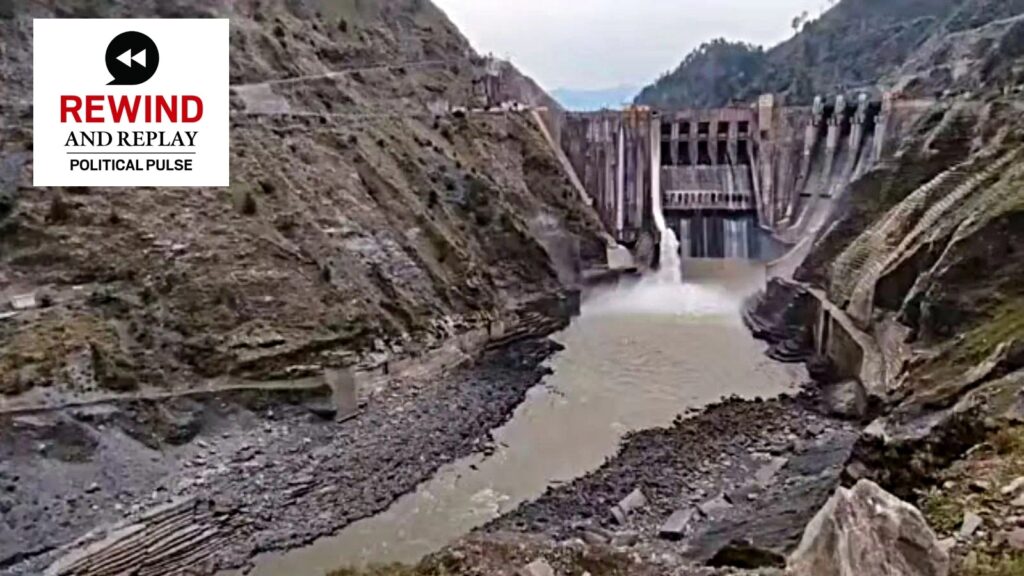BJP national president J P Nadda on Monday slammed former Prime Minister Jawaharlal Nehru for signing the Indus Waters Treaty (IWT) with Pakistan, terming it “one of Nehru’s biggest blunders”. Nadda also said that Nehru signed the treaty – which was suspended by India in the wake of the recent Pahalgam terror attack – without keeping Parliament in the loop and that the discussion that happened later in the House lasted all of two hours.
The IWT was signed between Nehru and then Pakistan President Ayub Khan on September 19, 1960, with the World Bank as a guarantor. The debate on the treaty took place in the Lok Sabha on November 30, 1960.
In a series of tweets, coinciding with the Parliament impasse over the Special Intensive Revision of election rolls in Bihar, Nadda said Nehru had kept “national interest at the altar of personal ambition”, and “unilaterally handed over 80 per cent of Indus basin waters to Pakistan:”. “It was a decision that permanently compromised India’s water security and national interest… The most appalling aspect was that he did it without consulting the Indian Parliament. The treaty was signed in September 1960. However, it was placed before Parliament only two months later, in November, and, that too, for a token discussion of mere 2 hours!” Nadda posted.
He went on to cite passages critical of the treaty from the Parliament debate.
The IWT, brokered by the World Bank, divides the waters of the Indus River system, allocating the eastern rivers (Ravi, Beas, and Sutlej) to India and the western rivers (Indus, Jhelum, and Chenab) to Pakistan. While India controls the eastern rivers, Pakistan gets access to the western rivers, though India can build run-of-the-river hydroelectric projects on the western rivers.
Excerpts from the Lok Sabha debate, which lasted just over two hours:
The discussion was opened by Akali Dal MP from Ferozepur Sardar Iqbal Singh, who said that Punjab’s voice “was not heard sufficiently despite it being most affected by the treaty”.
“We in Punjab fear that the farmers who depend on these waters may face insecurity. The Centre must ensure that Punjab’s interests are fully safeguarded before expecting us to accept this arrangement,” he said.
Atal Bihari Vajpayee, then a Jana Sangh MP from Balrampur, also opposed the treaty, saying: “We have bartered away our rights in the hope that Pakistan would treat us kindly. The government says the World Bank is a guarantor. But can the World Bank guarantee Pakistan’s goodwill? This treaty may well become another chapter in the story of our unilateral concessions.”
The IWT was not just about water, the future PM said, adding that Pakistan had never reciprocated India’s gestures and wondered if the treaty would be any different.
Praja Socialist Party (PSP) MP Asoka Mehta argued along the same lines, saying the IWT could not be “separated from the broader political realities with Pakistan”. Cautioning the government against “too much sentimentalism in these matters”, Mehta added, “The House must realise that the burden of expenditure is not light. It should not be ignored in enthusiasm… While we support peace with Pakistan, we must remain cautious that sentiment does not override national interest. The PM’s optimism is welcome, but Parliament should note the heavy financial burden India has to shoulder.”
Ganatantra Parishad MP Surendra Mahanty, urged the government not to be “carried away by hopes of goodwill and judge agreements with Pakistan with caution”. However, Mahanty added: “If this Treaty helps our farmers by removing uncertainty, I will not oppose it.”
From the Congress’s side, the IWT was defended by Nehru and then Irrigation Minister Hafiz Mohammad Ibrahim, apart from MPs A C Guha, B C Mathur and Kalika Singh.
Saying that the IWT represents not only an engineering statement but a political settlement of sorts, which gives India a chance to turn a new page, Nehru said, “I am not at all satisfied with this Treaty in the sense that I should have liked it to be different. But agreements are arrived at by mutual consent, not by one party imposing its will. We could have continued quarrelling indefinitely, but that would have been disastrous for both countries… It is better to have an agreed settlement on a vital matter like water rather than perpetual quarrels. We are not giving away our waters; we are using them in a planned way while ensuring peace and goodwill.”
Terming the IWT as “no small matter”, Ibrahim said the treaty would ensure that India got complete control over the waters of the eastern rivers. “It is not true that Pakistan is being given a gift. They will have to spend hundreds of crores to utilise what has been allocated… This treaty is a great engineering and administrative achievement. It ensures for us a dependable share of waters for generations to come. The World Bank’s role as a guarantor strengthens confidence in the execution of works and removal of disputes,” he added.
Guha hailed Nehru for his “vision in ending a long-standing quarrel”, and said the objections raised are “mostly theoretical”. “We must trust our engineers and planners who assure us that India’s requirements are safeguarded,” he said.
Mathur said that the treaty was “not an act of charity”, while Kalika Singh said the government had shown “courage to finalise a matter which was hanging fire for 13 years”. He also urged those opposing the IWT to offer a “practical alternative”.
Swatantra Party’s Brijraj Singh said the government should not brush aside the fears of farmers of Punjab and Rajasthan, who were uneasy over the IWT, as “imaginary”. “We are asked to believe that this treaty will ensure peace. But peace cannot be bought by surrender.”
While acknowledging the merit in the argument that “certainty was preferable to indefinite conflict (with Pakistan)”, Independent MP Krishnaswami said that the cost of the arrangement was “heavy “.

